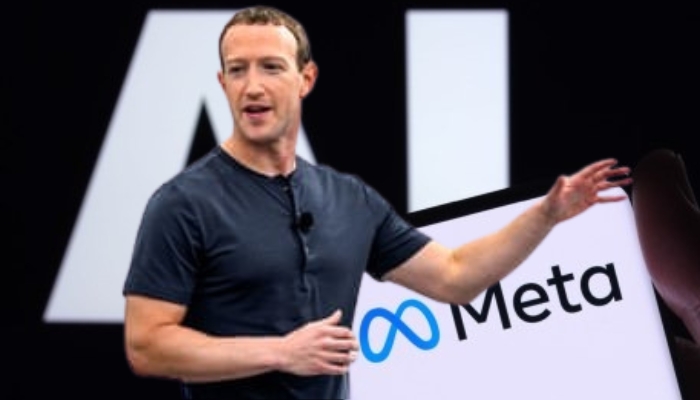
The drive to incorporate AI into Meta’s products has improved its financial results, yet share prices have fallen due to a pessimistic sales forecast
Meta’s push to integrate artificial intelligence into its products has resulted in strong financial performance for the second consecutive quarter. Despite this success, the company plans to increase its AI investment in the upcoming months. However, its share price plummeted by over 15% following the earnings report on Wednesday. This decline was attributed to a weak sales forecast and higher spending projections, which unsettled investors.
Mark Zuckerberg stated that his primary focus for the remainder of 2024 and likely 2025 would be to expand the usage of Meta AI to millions or even billions of people, rather than prioritizing revenue generation from it. He noted that products like Instagram Reels had previously not immediately generated revenue during their scaling phase but eventually became profitable components of Meta’s advertising business.
He reiterated a similar forecast for Meta AI, explaining, “We build out the inventory first and then we monetize it,” emphasizing that Meta is focusing on scaling the product before generating revenue from it.
Zuckerberg noted, “We’re more optimistic and ambitious about AI” compared to last quarter.
Despite analyst expectations of $36.16 billion, revenue at the world’s largest social media business surged 27% to $36.46 billion in the first quarter. Earnings per share also more than doubled to $4.71, exceeding Wall Street’s expectations of $4.32.
Shareholders were concerned by the revenue guidance for the next quarter, which is expected to reach $37.75 billion, reflecting approximately 18% growth. Analysts had anticipated a slightly higher figure of around $38.3 billion.
Mike Proulx, Forrester’s VP research director, remarked, “There’s no doubt that Meta is fully committed to AI, but realizing its vision requires substantial investments in infrastructure.” He likened Mark Zuckerberg’s cautionary note to past statements about the metaverse, which were met with challenges. However, Proulx highlighted that the situation with AI is different from Meta’s metaverse endeavor, as AI currently offers practical and tangible use cases.
Meta now anticipates its capital expenditure to range from $30 billion to $40 billion this year, an increase from the previous forecast of $35 billion to $37 billion.
Shares in the company, which owns Facebook, Instagram, and WhatsApp, experienced a significant decline in after-hours trading. The company did not declare a dividend for the first quarter of 2024, a departure from the previous quarter when it issued a dividend for the first time in its history, a move that had bolstered investors’ confidence.
Proulx noted, “The key question is whether Meta can compete in the AI race while also sustaining a strong financial position. To achieve this, we can anticipate more resources from ‘metaverse’ projects being redirected from Reality Labs to Meta’s AI initiatives.”
TikTok, a significant competitor, is grappling with intense regulatory scrutiny and uncertainty, prompting investors to seek safer investments. The day prior to Meta’s earnings report, the Senate passed a bill that would require TikTok to be sold to an American company or face a ban. President Joe Biden signed the bill on the day of the earnings report.
Meta’s CFO, Susan Li, stated that it was too early to gauge the bill’s impact on Meta’s business.
Despite these challenges, Meta’s shares have surged by nearly 40% this year. Investors have applauded Zuckerberg’s and the company’s shift from investing in metaverse products to focusing heavily on artificial intelligence.
Emarketer’s senior analyst, Max Willens, remarked that while the results were positive, Meta needed to sustain its upward momentum despite increasing costs.
“Despite recent scrutiny of its effectiveness, Meta’s advertising business is performing well,” Willens noted. “With inventory levels and average ad prices on the rise, Meta is once again achieving impressive margins, even as it continues to invest in long-term opportunities.”
Additionally, Meta recently announced plans to integrate its partially released Llama 3 large language model across its platforms. The Meta AI assistant will also be introduced in Australia, Canada, Singapore, Nigeria, and Pakistan. Furthermore, the company revealed intentions to incorporate real-time image generation into its social networks.
Investors also supported Zuckerberg’s announcement of a “year of efficiency” in 2023, which translated to four significant rounds of layoffs. The earnings report indicated that the company’s workforce had decreased by 10% since the previous year, with over 20,000 jobs cut, bringing the headcount back to a level similar to that of 2021. This reduction followed a doubling of the workforce from 2020.
However, regulatory challenges loom on the horizon. Zuckerberg testified at a congressional hearing earlier this year, during which lawmakers discussed the possibility of removing Meta’s primary legal shield for user-generated content.
Advocates argue that Meta doesn’t sufficiently safeguard children, a sentiment shared by some lawmakers. New Mexico’s attorney general is suing the company for reportedly enabling child predation, while over 30 states are suing Meta for allegedly endangering teenagers’ mental health.
Addressing parents at a hearing whose children had died by suicide after experiencing harassment and sex trafficking on social media, Zuckerberg said, “I’m sorry for all that you have been through.”



